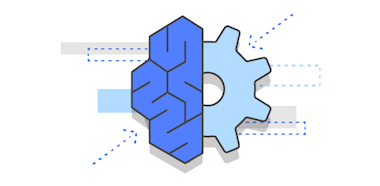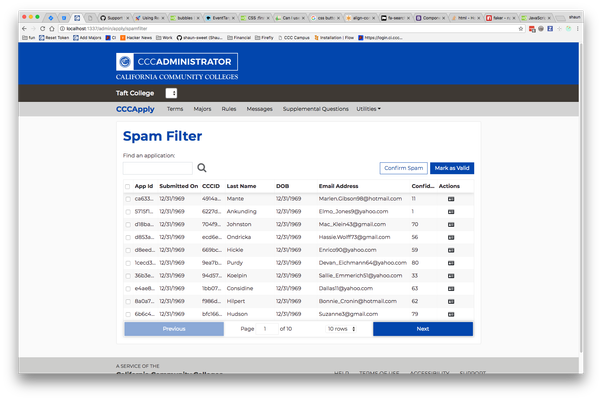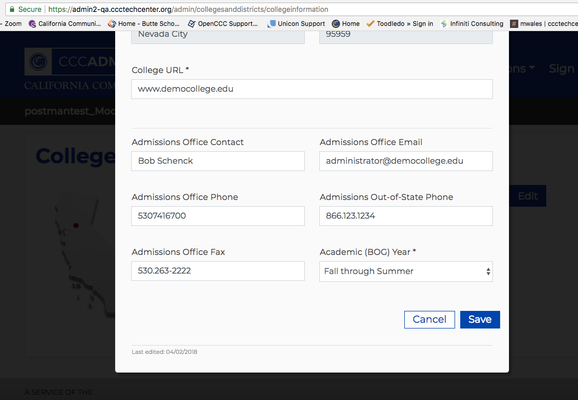Development of the spam filter web service and user interface began in early 2017 to assist colleges in making accurate and informed decisions on whether an application is fraud or not. The tool consists of three main components: the post-submission web service, the machine-learning model and prediction service, and the user interface to review and confirm identified fraud. This page talks about the Spam Filter User Interface project, what it includes, and how it operates.
|
Spam Filter User Interface
The Spam Filter User Interface is the hands-on utility that allows college staff to manually confirm the applications that have been predicted to be fraud are removed from the submission pipeline before they reaches the college's Download Client or the College Adapter (Project Glue). The user interface is built into the new CCCApply Administrator 2.0, a full feature parity upgrade to the legacy CCCApply Administrator (1.0) for the CCCApply Standard Application only.
As we learned above, every application that is submitted through CCCApply is analyzed by the machine learning model in the prediction service. If the prediction service believes that the application does meet the criteria for fraud, it will update the fraud status field flag from "Pending" to "Checked Fraud" and sends it to the suspension folder (User Interface) to be confirmed by the college's Admissions & Records staff.
Applications that do not meet the criteria in the prediction service are flagged as "Not Checked Fraud" and moved forward to the college for download.
Spam Filter Summary Table
Each application that is flagged with "Checked Fraud" will display in the "Spam Filter" summary table in the CCCApply Administrator 2.0. Each row/application has a checkbox, which the user can select individually or in bulk. Once a row/application, or set of applications, is selected, two buttons appear labeled "Confirm Spam" and "Mark as Valid" - giving the college full control over whether application(s) are moved to the continuous training model to grow the machine learning algorithm, or for legitimate applications that have been flagged in error, are removed from the suspension folder and placed back in the post-submission pipeline to be downloaded by the college.
- Confirm Spam button: The college should select this action to confirm that the application meets the criteria for spam and should NOT be downloaded by the college's Download Client
- Mark as Valid button: The college should select this action to remove the application from the spam suspension folder and push the application on to be downloaded by the college's Download Client
The Spam Filter User Interface tool has been built into the new CCCApply Administrator 2.0 which is being released to Pilot for testing on June 28 and will be live in Production on July 27, 2018. Read more about the new CCCApply Administrator 2.0 system release here.
User Interface Workflow
The workflow process for the user interface looks like this:
- College staff monitor suspension folder via user interface in CCCApply Administrator
- Suspended applications are reviewed by college staff for confirmation
- College staff make the final determination: Fraud or Not Fraud
- If “Fraud” - Then fraud status flag changed to “Confirmed Fraud”
- If “Not Fraud” - Then fraud status flag changed to “Confirmed NOT Fraud”
- “Confirmed Fraud” flag calls Apply Spam API
- Applications that are NOT fraud are sent immediately to the Download Client
- Confirmed Fraud/NOT Fraud applications are passed back to the ML model for continuous learning
Spam Monitoring & Email Notifications
As part of the User Interface workflow process, service monitoring has been implemented to notify the college that one or more applications has been flagged as fraudulent and is sitting in the User Interface for their confirmation (processing). If even one application has been predicted to be fraud and moved to the suspension folder, the college will receive an email notification alert reminder.
To help college's adapt to the new spam filter, monitoring has been implemented to alert the college by email if one or more submitted applications has been suspended in the Spam Filter (Summary Table). The two email messages are:
- Daily Spam Alert Email: Sends an email alert to the "Admissions Office Email" to notify the college that one or more applications have been suspended and need to be managed in the Spam Filter User Interface
- Reminder Spam Alert Email: Sends an email alert to the "Admissions Office Email" to notify the college that one or more applications has been sitting in the suspension folder for 3 days or more.
This email alert is a reminder to the college that all applications suspended in the Spam Filter need to be "confirmed" by the college in order for the model to continue to grow and learn.
| Note | ||
|---|---|---|
| ||
Setting Up the Spam Email Notification Recipient The Spam email notifications are sent out once per day if one or more applications are awaiting confirmation in the Spam Filter User Interface. Email notifications will be sent to the "Admissions Office Email" field in the "College Information" module in the CCCApply Administrator 2.0, which is accessible in the header from any application screen in the Administrator. Colleges should either update this important contact field with an appropriate email contact and address - to ensure the spam email notifications are sent to the correct Admissions Office staff member's email address responsible for monitoring the spam filter, or add email "forwarding" to that email address to the most appropriate email contact. |
It is the responsibility of each college to monitor incoming email notifications, as well as processing their suspension folder (User Interface) on a regular basis. Though the prediction service is calculating the probability ratings at a 98.99% accuracy rate, there is still a possibility that a legitimate application may get caught in the spam user interface; just like out own spam email filters.


